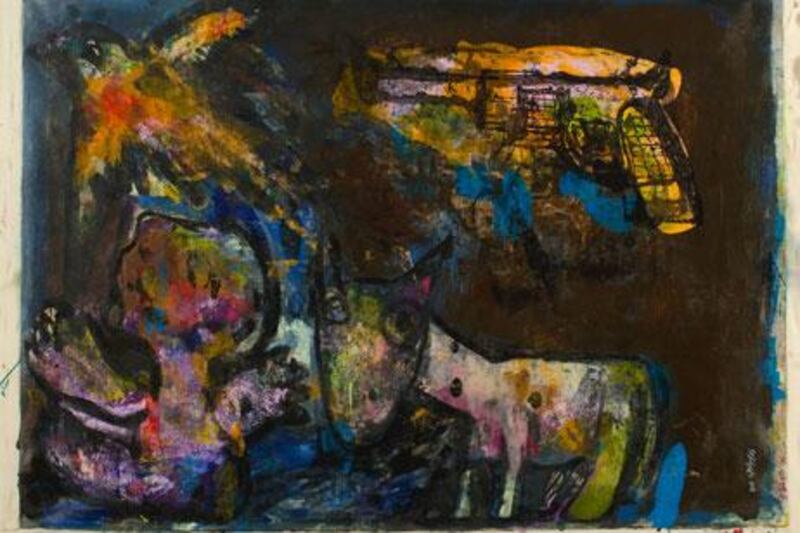The Syrian artist Fadi Yazigi is sitting under one of his striking canvases depicting twisted human forms. In the top right-hand corner is a bright yellow gun. On the day that even the Russian president, Dmitry Medvedev, finally called on Bashar Al Assad to reform or leave his office as the president of Syria, the symbolism is striking.
Yazigi smiles. As one of the Arab world's most interesting artistic voices - his broad body of work includes sculpture, reliefs, paintings on paper bags, video installations and portraiture, but nearly always reflects the Syria he still lives in - he's well used to explaining his work. "To be honest, it's visual art," he says. "It's not necessary to interpret every piece. But yes, I do feel a responsibility to reflect the personal tragedies I see in Syria. I've been working for 30 years now, every day, at my art. So my influences are all around me, I've always been interested in the faces of the people, the atmosphere of my country. It's not just in the last six months."
Of course, The Mosaic Rooms, the London gallery that regularly brings the cream of contemporary artists from the Middle East to the UK, had no way of knowing just how timely this retrospective of Yazigi's work would be when they first planned it more than a year ago. Like most art lovers who have followed this 45-year-old Damascene's career via exhibitions worldwide and the auction houses of London and Dubai, the interest was more in the smiling, bulbous bronze sculptures or the canvases filled with Picasso-esque figures. A year on, Yazigi is not only an artist, he's a commentator. Is he comfortable with that role?
"Well, the atmosphere is one of worry, of blood, of death. Everyone knows about it and sees it. It's often said that artists have a vision and, to take that literally perhaps, in my case, I can depict my country's dreams or future. The situation is simple, really: people are on the street wanting freedom. And the government won't let them have it. So we have to show people what's happening as artists and not hide behind things. We must tell the truth."
And yet it genuinely would be possible to walk in off the autumnal London streets and have no idea this was a collection of Syrian work by an artist with deep-seated political concerns. It's both this exhibition's weakness and strength - there's a subtlety here that means Yazigi is unlikely to incur the wrath of the Syrian authorities. Many of the pieces - including a lovely collection of portraiture with inscriptions from the subjects - actually feel positive and optimistic. His twisted creations are, more often than not, smiling - despite the violent oils swirling around them. Sometimes the smiles feel naive, but there's a stoicism and strength to the images.
"But then, sometimes you smile without knowing what will happen. Maybe you are going to die, but you smile," he says. "These people I paint are sometimes immature because there is a need for people to be stronger, more educated. That's what I'm trying to get across. They are good people, which is why they smile. They are the heart of the country. But to thrive they need to live in a better atmosphere. I believe there will be a better future, but I worry about what the cost might be to get it."
Yazigi doesn't seem overly concerned by the personal cost to him - he feels perfectly fine living and working in Damascus. But more generally, events in Syria have had a more insidious effect on his practice.
"It's taking me longer to make my work," he says. "Before it could be a matter of days, but now it's taking weeks. I really think that may be because it's becoming more painful to do. The situation around me and my friends is so confusing and the worry is coming out in how I work. One thing's for sure, the fear comes to the painting by itself, I don't have to go looking for it."
So perhaps this London show is just the break Yazigi needs. Rather than going over from Syria just for the opening, he's going to be in residence at The Mosaic Rooms for the next two weeks, sketchbook under his arm at all times. Just like in Syria, his work will be directed by the people who surround him, and he excitedly tells a story of a man he's just met on the London Underground who helped him get a cheaper ticket.
"He was like an angel," he beams. "He filled me with hope. You know, artistic influence isn't always about the great work in the museums. It's about the people you meet."
Fadi Yazigi's exhibition Che, Angel, It's Me, Donkey is at The Mosaic Rooms until Oct 28. www.mosaicrooms.org





